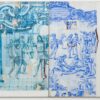Xiyun Wu
BA Honors | Art History
BIO
My name is Xiyun, and I am from Shenzhen, China. I am graduating from the University of Notre Dame with majors in Art History (Honors) and Asian Studies (Supplementary), with a minor in Japanese. After graduation, I will continue to pursue my interest in modern and contemporary Asian art through the Regional Studies—East Asia program at Harvard University. I am deeply grateful to all the faculty members in the Art History and Asian Studies departments who have been instrumental to my studies. I am especially thankful to my co-thesis advisors, Professor Elyse Speaks and Professor Tarryn Chun, for their profound guidance throughout the research and writing process, and their encouragement and mentorship in both fields over the past four years.
THESIS ABSTRACT
My thesis examines the body- and object-based performances in Chinese artist Zhang Huan’s oeuvre. Chapter One analyzes the sensorium of 65 Kilograms (1994), Zhang’s final performance at Beijing East Village. Reapproaching the work through the lens of xianchang yishu (live/on-site art), I draw on both textual and photographic witness accounts to interpret the performance as a sensory event. In particular, I foreground the tactile and olfactory dimensions as experienced by spectators, shaped by and through Zhang’s own body. Chapter Two addresses the materiality of ash in Zhang’s early ash paintings by examining the relationship between ash and photographic imagery. Focusing on two works, Great Leap Forward—Canal Building (2007) and Young Mother (2007), I analyze how ash, as both material and metaphor, mediates the photographic sources from which these images are drawn. My analysis reveals that Zhang’s body and materials not only operate as sites of endurance in response to ideological structures, but also as agents of sensory, spatial, and photographic transformation. By foregrounding the frameworks of xingwei-zhuangzhi (performance-installation) and “staging,” and by situating individual works within their broader performative and exhibition contexts, this thesis positions Zhang Huan’s artistic practice within an expanded field of performance—one that engages spectators through lived presence and mediated memory.



